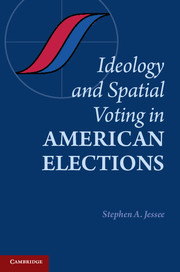Crossref Citations
This Book has been
cited by the following publications. This list is generated based on data provided by Crossref.
Adams, James
2012.
Causes and Electoral Consequences of Party Policy Shifts in Multiparty Elections: Theoretical Results and Empirical Evidence.
Annual Review of Political Science,
Vol. 15,
Issue. 1,
p.
401.
Peterson, Erik
and
Simonovits, Gabor
2014.
Costly Values: Values-Based Justifications Exacerbate the Consequences of Policy Disagreements for Politician Support.
SSRN Electronic Journal,
Shor, Boris
and
Rogowski, Jon
2015.
Ideology and the US Congressional Vote.
SSRN Electronic Journal,
Papageorgiou, Achillefs
and
Autto, Hannu
2015.
Is there a relationship between party system polarization and voters’ proximity to the parties in the left–right dimension?.
Acta Politica,
Vol. 50,
Issue. 3,
p.
344.
Klingler, Jonathan
and
Hollibaugh, Gary E.
2016.
What I Like About You: Legislator Personality and Legislator Approval.
SSRN Electronic Journal,
Lu, Ye
Chu, Yajie
and
Shen, Fei
2016.
Mass media, new technology, and ideology: An analysis of political trends in China.
Global Media and China,
Vol. 1,
Issue. 1-2,
p.
70.
Chen, Philip G.
and
Goren, Paul N.
2016.
Operational Ideology and Party Identification.
Political Research Quarterly,
Vol. 69,
Issue. 4,
p.
703.
Jessee, Stephen
2016.
(How) Can We Estimate the Ideology of Citizens and Political Elites on the Same Scale?.
American Journal of Political Science,
Vol. 60,
Issue. 4,
p.
1108.
Weeden, Jason
and
Kurzban, Robert
2016.
Do People Naturally Cluster into Liberals and Conservatives?.
Evolutionary Psychological Science,
Vol. 2,
Issue. 1,
p.
47.
Dassonneville, Ruth
Hooghe, Marc
and
Miller, Peter
2017.
The impact of compulsory voting on inequality and the quality of the vote.
West European Politics,
Vol. 40,
Issue. 3,
p.
621.
Lofland, Chelsea L.
Rodríguez, Abel
and
Moser, Scott
2017.
Assessing differences in legislators’ revealed preferences: A case study on the 107th U.S. Senate.
The Annals of Applied Statistics,
Vol. 11,
Issue. 1,
Adams, James
Engstrom, Erik
Joeston, Danielle
Stone, Walt
Rogowski, Jon
and
Shor, Boris
2017.
Do Moderate Voters Weigh Candidates’ Ideologies? Voters’ Decision Rules in the 2010 Congressional Elections.
Political Behavior,
Vol. 39,
Issue. 1,
p.
205.
Tausanovitch, Chris
and
Warshaw, Christopher
2017.
Estimating Candidates’ Political Orientation in a Polarized Congress.
Political Analysis,
Vol. 25,
Issue. 2,
p.
167.
Mummolo, Jonathan
Peterson, Erik
and
Westwood, Sean
2018.
Conditional Party Loyalty.
SSRN Electronic Journal,
Shor, Boris
and
Rogowski, Jon C.
2018.
Ideology and the US Congressional Vote.
Political Science Research and Methods,
Vol. 6,
Issue. 2,
p.
323.
Kousser, Thad
Phillips, Justin
and
Shor, Boris
2018.
Reform and Representation: A New Method Applied to Recent Electoral Changes.
Political Science Research and Methods,
Vol. 6,
Issue. 4,
p.
809.
Tausanovitch, Chris
and
Warshaw, Christopher
2018.
Does the Ideological Proximity Between Candidates and Voters Affect Voting in U.S. House Elections?.
Political Behavior,
Vol. 40,
Issue. 1,
p.
223.
Grafstein, Robert
2018.
The problem of polarization.
Public Choice,
Vol. 176,
Issue. 1-2,
p.
315.
Hare, Christopher
Liu, Tzu-Ping
and
Lupton, Robert N.
2018.
What Ordered Optimal Classification reveals about ideological structure, cleavages, and polarization in the American mass public.
Public Choice,
Vol. 176,
Issue. 1-2,
p.
57.
Zingher, Joshua N.
and
Richman, Jesse
2019.
Polarization and the Nationalization of State Legislative Elections.
American Politics Research,
Vol. 47,
Issue. 5,
p.
1036.





